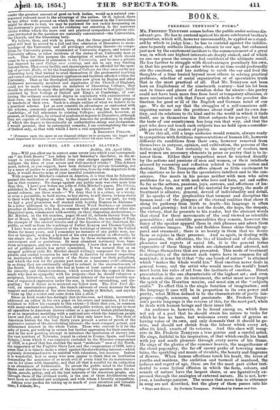JOHN MITCHEL AND AMER/CAN SLAVERY.
Dublin, 5th April 1854.
Sim—Will you allow me to correct some errors into which your correspond- ent "An lrish Reader" has fallen in last Saturday's Spectator, in his at- tempt to exculpate John Mitchel from your charges against him, and to mitigate the force of your severe and well-merited rebuke ? This defence must, indeed, as you suggest, have been dictated by private friendship, not by a sense of justice to a public man ; otherwise, from its wide departure from facts, it would deserve none of your merciful consideration. With respect to Mitchel's conduct in America, it is true that he fulsomely praised the institution of slavery, to the disgust even of the Anti-Abolition- ists in that country. No charge against any public man was ever more true than this. I have now before me a file of John Mitchel's raper, The Citizen, published in New York, and in No. 2, page 25, at the lower part of the second column, are these words—" We deny that it is a crime, or a wrong, or even a peccadillo, to hold slaves, to buy slaves, to sell slaves, to keep slaves to their work by flogging or other needful coercion. For our part, we wish we had a good plantation well stocked with healthy Negroes in Alabama." In a letter addressed to the Reverend Henry Ward Beecher,— an eminent preacher at Brooklyn, who had, in common with great numbers of other dis- tinguished men, commented with severity on these disgusting declarations,— Mr. Mitchel, in the 4th number, pages 50 and 57, defends slavery from the law of Moses, the implied pernussion of Jesus Christ, the teachings of Paul, the example of the ancient Greeks and of the founders of the American Re- public, as well as from the teachings of Father Kenyon and Thomas Carlyle. I have been an attentive observer of the workings of slavery in the United States for many years, and I remember no instance of any public man, na- tive or foreigner, making a byword of his own reputation so effectually, by one single act, as John Mitchel has done by these declarations, at once so extravagant and so gratuitous. By most abundant testimony from Ame- rican newspapers, and my own correspondents, I learn that a more decided act of political suicide was never committed. It was natural that as an escaped political exile Mr. Mitchel should willingly compound for the hos- pitable and cordial reception he met with in America by silence respecting an institution which one portion of the States regard as their palladium, and which the rest for the greater part treat as a necessary evil—although in so doing they are continually obliged to submit to the encroachments of the South. But that a man who had at home at least earned a reputation for sincerity and disinterestedness, which secured him the respect of thou- sands who had no sympathy with his projects—that he should volunteer a scriptural, historical, moral, and personal defence of the most terrible sys- tem of organized oppression under the sun, is indeed astonishing, and dis- gusting • for it forces us to mistrust our fellow men. The Hew York He- rald, an unscrupulous paper, the stanch advocate of every measure for the support and extension of the slave interest, laughs at Mitchel, and says he "went up like a rocket and came down like a stick." Fmee an Irish reader has daringly (but in this case, as I think, incorrectly) addressed an editor in his own paper on his errors and mistakes, I feel em- boldened to follow his example to this extent—I think that you, in common with many eminent authors, travellers, and public writers, are too apt to treat all opposition to American slavery either as a species of foolish philanthropy, or as an imprudent meddling with a national sore which the American people know and feel, and are willing to heal if they only knew how. The facts of American history for the last thirty years present a series of proofs of the aggressive nature of the slaveholding interest—the most compact, potent, and determined interest in the whole Union. Those who concede to it for the sake of peace, get nothing in return but further aggression for their courtesy. And in the now pending attempt to introduce the institution of slavery into the vast territory of Nebraska, (equal in extent to France, Spain, and Great Britain,) from which it was expressly excluded by the Missouri compromises of 1820, is a proof that has startled the most "moderate" men of the North, the supporters of the Fugitive Slave Law and the compromises of 1860, into a seine that it is time to make a stand against the slaveholding interest—which isplainly determined not to be satisfied with toleration, but mastery. Indeed it is wonderful, how so many wise men appear to think that an institution demanding the assistance of so much evil of every kind for its maintenance can be let alone with impunity, and that all that is needful for its extinction is an abundance of forbearance. To arouse the public mind in the United States and elsewhere to a sense of the bearings of this question upon the-re- ligion, morals, policy,.and all the best interests of the American people, and through them of the civilized world, is the aim of those Abolitionists who have been so ridiculed and maligned, and with whom I heartily sympathize. Asking your pardon for taking up so much of your attention and valuable


























 Previous page
Previous page